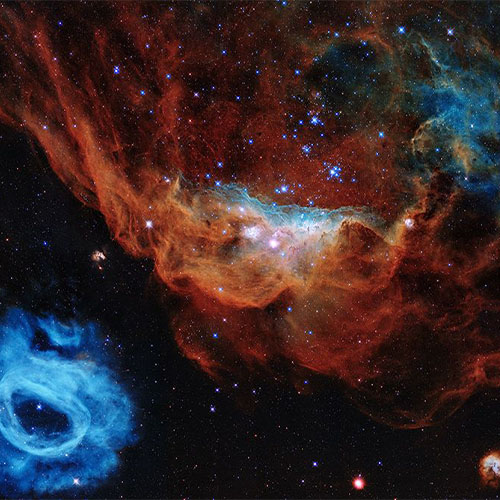Telecare’s monthly news roundup is back and we have some good news stories to share with you. Recently, the headlines have reflected the COVID-19 crisis and rightly so. However, we know this can be rather overwhelming, so we want to try and bring you some uplifting stories from the pandemic that might have flown under the radar. From celebrity tour buses for the NHS to home stargazing tips, here’s what we have to share this month.
Hubble Telescope Delivers Stunning 30th Birthday Picture
This month marks thirty years since the launch of the Hubble Telescope. On 24 April 1990, Hubble became the first major telescope to be placed in space. Since its launch, it has been responsible for several scientific breakthroughs over the years. Data provided by Hubble has helped us discover new moons, determine the rate of the universe’s expansion, and even work out the age of the universe itself. The telescope was named for Edwin Hubble, who in 1924 proved the existence of galaxies outside our own.
The above image, nicknamed ‘Cosmic Reef’, was released by NASA to celebrate the Hubble Space Telescope’s 30 years of observations. It depicts a nebula about 163,000 light-years away from Earth. Some of the stars in this nebula are up to 10-20 times larger than our Sun!
Celebrities Give Their Tour Buses To The NHS
The national lockdown in the UK has been in place since 24 March and everyone has had to adapt very quickly to a strange, new way of life. Musicians are no exception. With gigs and music festivals across the world being cancelled or postponed, tour bus hire company Vans For Bands has found a wonderful way to put their fleet of vans to good use.
Tarrant Anderson, the director of Vans For Bands, decided to offer his fleet of luxury sleeper buses to the NHS. He wanted to provide safe places outside hospitals for NHS staff to rest at the end of their shifts. For now, thanks to the kindness and ingenuity of Vans For Bands, doctors, nurses, and other NHS key workers are able to get some sleep and relaxation in the same luxury as their favourite rockstars.
It goes without saying that these buses also allow the staff who use them to maintain proper social distancing in order to stop the spread of the virus. At the time of writing, there are currently tour buses parked outside The Royal Berkshire NHS Trust Hospital, The Whittington Health NHS Trust Hospital, The Hillingdon Hospitals NHS Trust, The North Tees and Hartlepool NHS Foundation and Trust Hospital, and The Lewisham and Greenwich NHS Trust.
You Can Travel The World Wirelessly
Many of us will be missing out on holidays this year, another unfortunate result of the pandemic. Perhaps you are a keen traveller, missing the sounds of a new city: the unfamiliar accents and brand new voices. Or, perhaps you enjoy listening to the radio, but you’ve grown bored of your usual station. If so, you are in luck.
The new Radio Garden app allows you to tune in to national and local radio stations from all around the world. You can navigate the globe with your mouse and browse thousands of stations, each represented by a green dot. From Sydney to Sheffield and Cardiff to California, or even your own local station, listening to the radio can be an excellent way to combat loneliness and find a sense of community. Why not send an email to your new favourite station and request your favourite song?
Granted, it might not be a replacement for a week spent lounging by a pool in the sunshine. However, when people are most at risk of feeling isolated, technology like this does a wonderful job of reminding us that we are closer together than we might feel.
Tips On Star Gazing From Your Back Garden
If you were impressed by the beautiful image provided by the Hubble Space Telescope, perhaps you might like to give stargazing a try for yourself. Even the most amateur astronomer can get started from the back garden. You don’t even need a telescope or binoculars to begin; you can learn about the wonders of the night sky with nothing more than the naked eye and the help of one or two apps for your smartphone or tablet.
To get started, you’ll need to familiarise yourself with north, south, east, and west. You can work this out for yourself by taking note of where the sun rises (east) and sets (west). Alternatively, you can use Google Maps to orient yourself or see if your phone features a compass. Then, using an app such as Stellarium, Sky Map, or Starwalk, you can set your location and identify the stars and planets that are visible to you. You can choose a star and your app will help you find it by telling you which direction it lies and how high up to look.
To get the best results, you will need to turn off any lights and let your eyes adjust to the darkness for around 30 minutes. It is important to clear any clutter or trip hazards from your immediate area before you do this.
If you are worried about trips and falls, it might be worth considering a Telecare Choice Alarm. To find out more, please give us a call on 0800 635 7000



